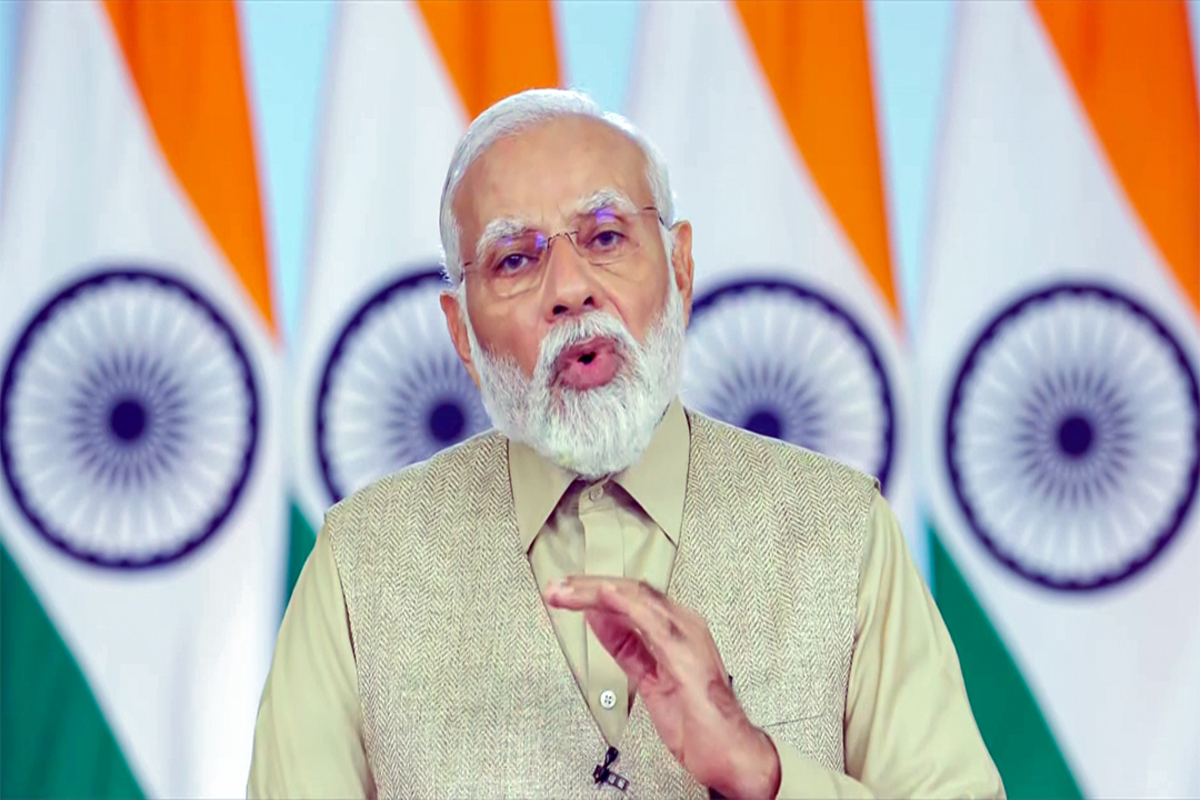Prime Minister Narendra Modi on Sunday said natural disasters like those occurring during the current rainy season can be faced with capabilities and resources, but what they equally require is sensitivity to others’ pain and difficulty.
Delivering the 103d episode of his Mann Ki Baat over radio and Doordarshan, he said people suffered in various ways during the current monsoons. There were floods and landslides in the hills. Biparjoy cyclone struck parts of Gujarat.
Advertisement
People faced the disasters with collective effort and showed its power, Mr Modi said. Local populations joined by National Disaster Response Force (NDRF) men and local administrations fought the disasters together.
To face any disaster, capacity and resources do play a big role, the Prime Minister said, but along with this, “our sensitivity and readiness to hold each other’s hand” in difficulty is equally important. This concern for welfare of all identifies India and is the nation’s strength, he said.
He said the monsoons are a season for tree plantation and water conservation also. More than 60,000 Amrit Sarovars (water ponds) built during the Azaadi ka Amrit Mahotsav are attracting people. Work of constructing another 50,000 Amrit Sarovars is going on.
Mr Modi said recently he visited Pakaria village in Shahdol of Madhya Pradesh and discussed saving nature and water with tribals there. He has learnt that the tribal brothers and sisters of Pakaria village had with the help of local administration, converted about 100 wells into water recharge systems.
Rain water now flows into these wells, and from the wells, the water enters the ground, he said. This will gradually improve the ground water level in the area. The villagers have set a target of using about 800 wells in the entire area for recharging.
In Uttar Pradesh, record 30 crore trees were planted in a single day, he said. This campaign was started by the state government and completed by the people there. Such efforts are great examples of public participation as well as public awareness. “I would like all of us to be a part of these efforts to plant trees and save water,” he said.
Mr Modi said the 15th of August is round the corner. Another great campaign ‘Meri Mati, Mera Desh’ is about to be launched to honour martyred brave-heart men and women. In the memory of these luminaries, special inscriptions will be installed in lakhs of village panchayats of the country. An Amrit Kalash Yatra will also be organised across the country, he said.
This Amrit Kalash Yatra of carrying soil in 7500 urns from every corner of the country will terminate in Delhi. The participants will carry with them saplings from different parts of the country. All these will be used for the Amrit Vatika to be built near the National War Memorials, he said.
This Amrit Vatika will become a grand symbol of Ek Bharat Shresth Bharat, the Prime Minister said. “I had talked about ‘Panch Prana’ for the next 25 years of Amritkal from Red Fort last year. By participating in the ‘Meri Mati Mera Desh’ campaign, we will also take an oath to fulfil these five resolves,” he said.
“All of you should certainly upload your selfies on yuva.gov.in while taking oath, holding the sacred soil of the country,” he said. Last year, on the occasion of Independence Day, the whole country came together for the Har Ghar Tiranga Abhiyan, the Prime Minister said.
Similarly this time too everybody should hoist the Tricolor at their houses. This will make everyone remember their duties and sacrifices made for the freedom of the country, he said.
The Prime Minister talked of several initiatives taken across the country to save its culture and heritage. The country should not only embrace its heritage but present it also to others responsibly, he said. India accepts everyone and gives something or the other to everyone, Mr Modi said.
He said women of Uttarakhand had learnt the use of Bhojpatra and turned it into a means of livelihood. Today, the products of Bhojpatra are very much liked by pilgrims visiting the State and buying them. The state government has also started a campaign to preserve the rare species of Bhojpatra, he said.
The Prime Minister said Muslim women who had recently undertaken Haj pilgrimage without male companions or mehram had written letters to him. Their number was more than 4.000. This is a huge transformation. Earlier, Muslim women were not allowed to perform ‘Haj’ without Mehram.
“Through Mann Ki Baat, I also express my heartfelt gratitude to the Government of Saudi Arabia. Women coordinators were specially appointed for women going on ‘Haj’ without Mehram,” he said.









